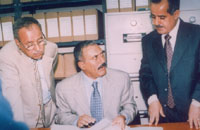
Organization for keeping informationPreserving Yemen’s national memory [Archives:2005/804/Culture]
January 6 2005
 |
For The Yemen Times
The Central Organization for Control and Audit has helped record Yemen's history. Muhammad Dirhem Zaid, the organization's deputy chairman, spoke recently about future policies and strategies of the organization in terms of preserving documents. Following are edited excerpts from his interview.
Q. Is there any improvement and modernization in the shadow of low cultural awareness and backwardness about information systems in most of the state's organizations and establishments?
A. There is no development without planning, and no planning without conducting field studies and researches; no studies without census and information; no information without the existence of documents, documentation systems and modern archives.
Document and information issues were given earlier attention by the political leadership. Construction of National Center for Documents, the National Center for Information, and several documentation and information specializing centers are considered as a true embodying to the increasing care and support of the president.
Q. Is there a certain strategy being adopted by the Central Organization for Control and Audit?
A. The control work starts with the planning, collecting and analyzing of data and then checking and assessing internal auditing systems, the internal control procedures, and reviewing the registers, books, and documents so as to assure its efficiency.
What I wish to emphasize here is the issuance of instructions from Prof. Abdullah al-Sunafy, the chairman of the organization to all the organization sectors and its branches to pay attention and to continuously follow-up all the issues connected with the national memory, and to take the necessary procedures to treat and correct all the defects and the negativity. We may say, that these issues have occupied a characteristic position in the organization plan for this year and the coming years.
Q. How do you evaluate the random procedures which lead eventually to the documents damage?
A. In fact, the report of the organization have recorded some documents and instruments damaging incidents and also incorrect preserving of the different types of documents (audio-visual, maps, documents, register) and some units which got rid of its old documentation records without referring to the National Center for Documents. This attributes to the non-reviewing by the administrative leadership.
The documentation law has put an end to all the random works which destroy the national memory and also to all the transcendence and infringements in the line of documents collection and its preserving, its possession and its smuggling. In fact, the organization has notified of this phenomena danger earlier.
Q. Is the organization work restricted to controlling over the actual existence of the documents and properties of the governmental units?
A. The works of the organization is not restricted to the sides which I have clarified but also exceeds it to include works of evaluating and following-up the methods and means adopted in preserving and maintaining operations of the fixed assets of the documents, maps and agreements, and to propose special means for its protection and maintenance.
Q. What are the prominent issues that the reports of the organization have recorded?
A. Some administrative and financial units have got rid of the old documents and instruments without notifying the Central Organization for Control and Audit or the National Center for Documents.
Some Authorities have spoken with the organization for contribution in damaging operation or documents burning without referring to the National Center for Documents and without their knowledge of documents laws which forbid such random works that destroy the national memory.
Q. At the conclusion of the Yemeni history between recording and documentation, several general recommendations were issued on rescuing the Yemeni documents and the assurance of the necessity of the Central Organization's contribution in all the projects connected with the preservation of the National Memory in future. What does that attribute to?
A. I wish to direct my thanks and appreciation to the leadership of the General Center for Studies, Researches & Issue, and all the members of the Consultative Assembly for the Center, represented by the Head of the Consultative Assembly, Dr. Abdul Kareem al-Iryani, Consultant to the President of the Republic, and also to the Chairman of the General Center, Mr. Ahmed Ahmed al-Shur'abi, who observed to take the Central Organization for Control & Audit into partnership into these documentary scientific events.
Q. There is a valuable and rare documentation wealth in the documentary audio-visual bookshops within the radio and television establishment in Aden which exposed to complete damage. What is the role of the Organization in this matter?
A. There is an early tendency by the political leadership represented by the personality of the President of the Republic as a pioneer for the documentation advancement in Yemen aiming to pay great attention to such issues in all the Republic of Yemen governorates. We work in coordination and cooperation with the leadership of the National Center for Documents to take urgent steps to rescue this national wealth.
By the way, I would like to confirm that there is continuous follow-up and interest in such essential national issues by the Director of the Republic Presidency Bureau, Mr. Ali Muhammad al-Anesy, and to which matter he assured, upon the inauguration of the yearly 13th meeting of the organization leadership, of the importance of drawing a comprehensive strategy for the organization to help in assuring its professional role in protecting the public finance and property.
——
[archive-e:804-v:13-y:2005-d:2005-01-06-p:culture]


